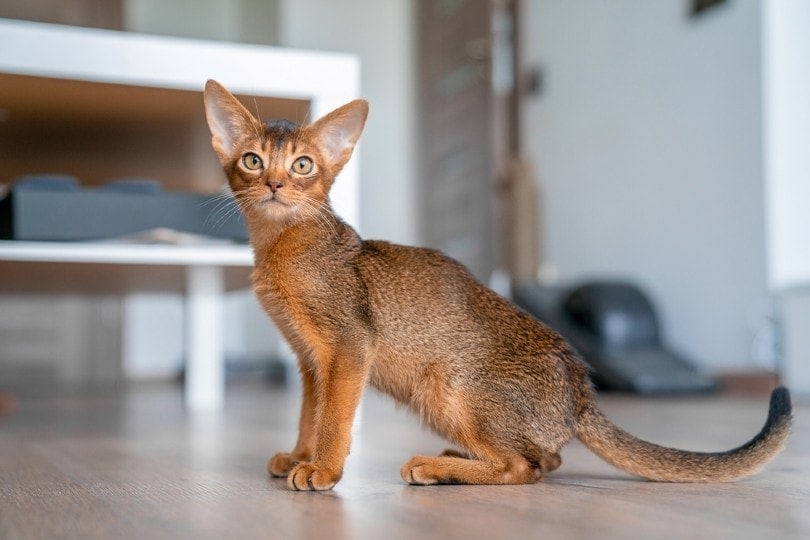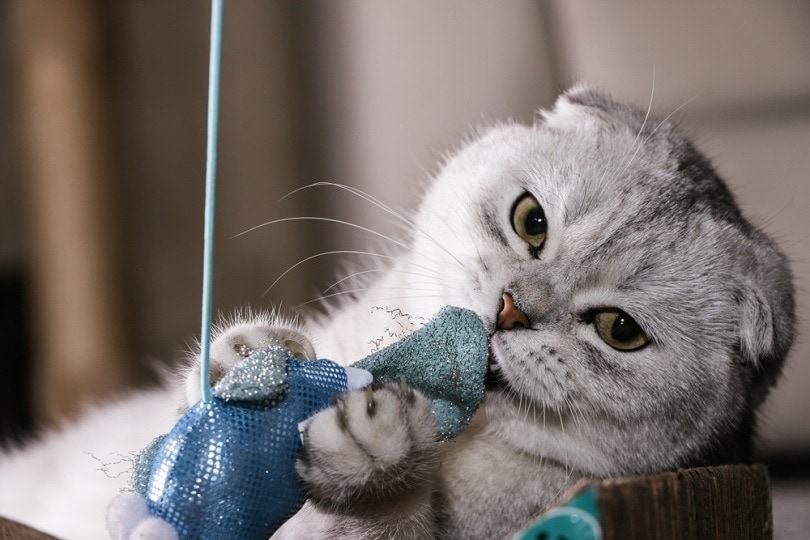Can Cats Eat Mashed Potatoes? Vet-Reviewed Nutritional Benefits & Risks
Updated on
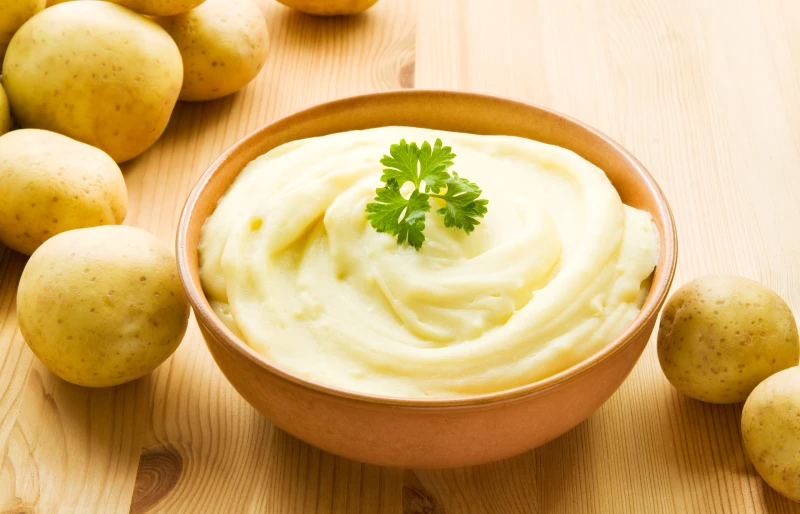
Click to Skip Ahead
Mashed potatoes top many people’s lists of favorite comfort foods. They are a staple at family dinners, particularly during holidays like Thanksgiving. But have you ever been enjoying a dinner that includes mashed potatoes, and your cat seems interested in them? Are mashed potatoes safe for cats to eat?
Potatoes aren’t toxic to cats, but they don’t provide any real benefits for them either. Many common additives to mashed potatoes aren’t good for felines, and some are downright toxic.
Let’s break down what makes mashed potatoes not ideal for cats and the ingredients that you should absolutely avoid!
Why Shouldn’t Cats Eat Mashed Potatoes?
Potatoes by themselves aren’t bad for cats, but the biggest issue with mashed potatoes is the ingredients added to them.
Salt
Mashed potatoes can contain a lot of salt, which is an ingredient that cats should only have in moderation. Your cat’s regular wet or dry food should have the appropriate amount of salt that they need, so anything beyond this would just be extra and might be too much.
If your cat ate a tiny amount of mashed potatoes containing a lot of salt, it isn’t necessarily going to cause any serious harm. Consuming things like Play-Doh and drinking seawater are more likely to lead to salt poisoning in your cat, but be aware of the following salt toxicity signs:
- Vomiting
- Diarrhea
- Decreased appetite
- Lethargy
- Incoordination
- Excessive thirst
- Excessive urination
- Tremors
Dairy

You might also find dairy products in mashed potatoes. Typically, mashed potatoes are made with milk or cream and butter. The issue with dairy is that most adult cats are lactose intolerant and might experience:
- Bloating
- Gas
- Abdominal pain
- Diarrhea
- Nausea
- Vomiting
Cats eating dairy-laden mashed potatoes might experience gastrointestinal upset. This can be dangerous if the vomiting and diarrhea last too long. A cat can become dehydrated quickly, which can be fatal if not treated.
Garlic and Onions
Garlic, including garlic powder, may be added to mashed potatoes. Garlic can be highly toxic to cats in high enough amounts.
- Lethargy
- Pale gums
- Drooling
- Abdominal pain
- Vomiting
- Diarrhea
- Increased respiratory rate
- Weakness
- Collapse
While onions aren’t commonly used in mashed potatoes, they are sometimes used in gravy. Onions and everything related to them, such as shallots, chives, and leeks, are highly toxic to cats.
Are Potatoes Safe for Cats?
Cooked potatoes are not toxic to cats, but they aren’t all that beneficial for them either. Felines are obligate carnivores, which means their diet should be comprised mainly of meat. A cat’s digestive system is honed to get its nutrition mainly from meat. It has a hard time breaking down plant material, including potatoes.
That said, potatoes are not toxic, and cats can eat a small amount as long as the potatoes are made the right way.
Do Potatoes Offer Nutritional Benefits to Cats?
Potatoes do have some nutritional benefits for cats. For one thing, they are a good source of water, which can help keep your cat hydrated.
- Vitamin B6
- Potassium
- Iron
- Magnesium
- Calcium
But they are also high in carbs and low in protein, so while potatoes have a few benefits, there really aren’t enough to justify giving them to your cat regularly.
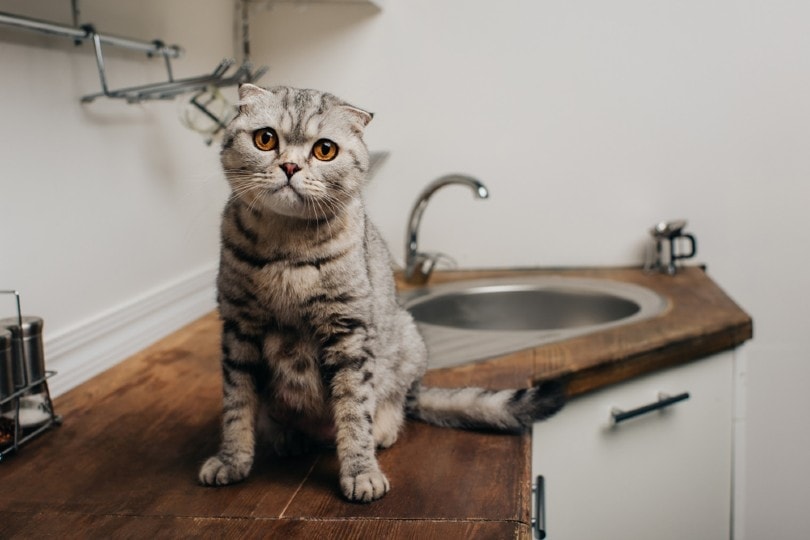
Frequent Asked Questions
Can Cats Eat Raw Potatoes?
No. Raw potatoes can pose a choking hazard. Additionally, potato peels and raw and green potatoes contain an alkaloid called solanine, which is toxic to cats. These parts of the potato tend to be bitter, so it’s not likely that your cat will be interested in eating them, anyway.
The leaves and stems of potato plants also have high concentrations of solanine.
Can Cats Eat Sweet Potatoes?
The same rules apply to sweet potatoes. While they aren’t toxic, cats will have difficulty digesting them and might experience vomiting and diarrhea if they eat too much. A small amount is okay, with no ingredients or seasonings added.
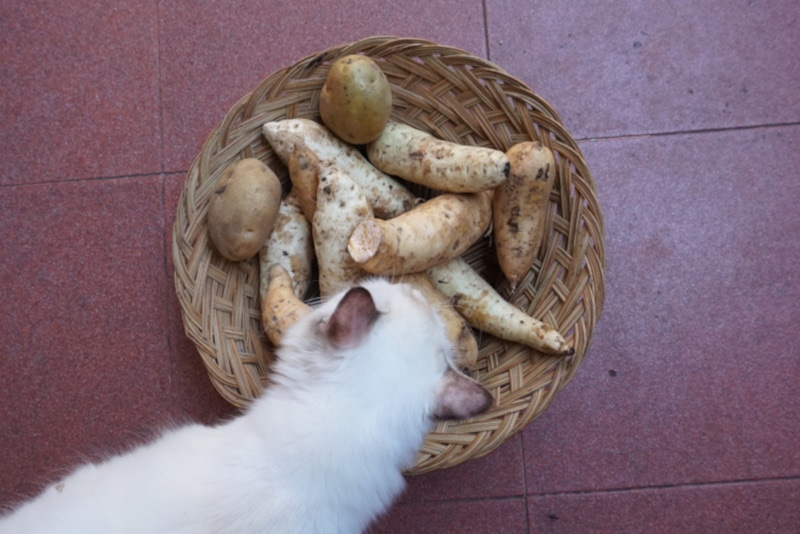
Can Cats Eat Baked Potatoes?
In moderation and without seasonings, baked potatoes are safe for cats, but the digestion issue is still a factor. You can offer a small amount of baked potato without the skin or any of the usual toppings like salt, butter, sour cream, and especially chives!
Are Potato Chips Okay for Cats?
Potatoes that have been fried in oil and are covered in salt are not acceptable for cats. This includes potato chips and French fries. Even if the chips are baked, there are usually seasonings, additives, and preservatives that are definitely bad for cats.
Conclusion
Plain mashed potatoes are not toxic to cats. A tiny amount of plain mashed potatoes is okay once in a while, but it shouldn’t be a regular thing. They won’t contribute to your cat’s health in any real way and might cause gastrointestinal issues, such as diarrhea and vomiting.
Your best bet is to stick with the occasional treat that has been made specifically for cats, which they will probably love more than potatoes, anyway.
Featured Image Credit: Inga Nielsen, Shutterstock



